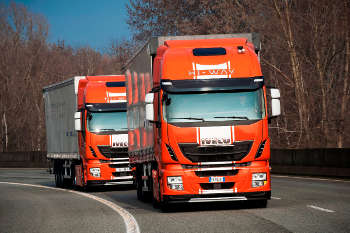There are serious obstacles to HGV platooning in the UK and promoting the new technology could take freight off rail and onto the road, campaigners have said.
Freight on Rail, which is a partnership between Campaign for Better Transport, the rail freight industry and transport trade unions, has responded to the Department for Transport’s (DfT) consultation on platooning HGVs as part of its autonomous vehicles plans.

Platooning involves vehicle to-vehicle communication
It warned that if platooning reduces HGV costs further it will make it ‘even harder’ for rail freight to compete and ‘could result in trainloads of freight going back onto the UK’s congested road network’.
Platooning involves two or more vehicles connected with vehicle to-vehicle communication, allowing them to effectively operate as a single unit.
In its consultation, the DfT said reducing the headway between vehicles allows them to benefit from reduced aerodynamic drag and therefore increased fuel efficiency. It said platooning could also free more road space and improve traffic flow.
Philippa Edmunds, Freight on Rail manager, said: ‘Whilst platooning could be viable in some other countries, there are serious obstacles to HGV platoons being practical in the UK.
'The UK’s road network is already very congested, with frequent motorway exits close together, and it is unclear how platoons will interact with other road users or how vehicles will overtake and enter and exit junctions safely.
‘Rather than aiming to reduce carbon dioxide emissions by 10% through platooning, the Government could be cutting emissions by three quarters by switching more freight to rail.’
Freight on Rail said promoting platooning as a way to reduce hauliers’ costs ‘fails to acknowledge the increased costs to society and the economy if more sustainable transport modes are undermined further’.
It argued that reducing HGV costs is likely to lead to more lorry miles as freight is carried further, with ‘huge cost implications for the taxpayer as HGVs are up to 160,000 times more damaging to road surfaces than the average car and six times more likely to be involved in a fatal collision’.
The DfT is investing in a platooning trial later this year ‘to assess the benefits that could be obtained when operating platoons on our roads’.
Register now for full access
Register just once to get unrestricted, real-time coverage of the issues and challenges facing UK transport and highways engineers.
Full website content includes the latest news, exclusive commentary from leading industry figures and detailed topical analysis of the highways, transportation, environment and place-shaping sectors.
Use the link below to register your details for full, free access.
Already a registered? Login